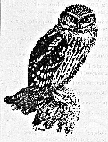
Visit Kypros-Net a new WEB source on Cyprus


Another resident bird of Cyprus belonging to the same family, the Strigidae, is the Little Owl. It is well-known from ancient times as it was the holy bird of Goddess Athena, the emblem of Athenians and the symbol of wisdom. Aristophanes' proverb “komizw glavka es Athnvas”, which corresponds to the English proverb "carry coals to Newcastle" is still in use today. Throughout the ancient Greek world the Little Owl appeared on countless representations ranging from sculptures to coins.
Little Owls are fairly common resident birds in Cyprus. The upper parts of the bird are grey-brown streaked with white, while the under parts show pale streaking on brown. It has a frowning expression on its round face. One may often see them in broad daylight. When disturbed they bob in a grotesque way and then stay motionless, the wide lemon eyes staring. It has no ear tufts. When feeding they drop down from their perch to take a mouse or beetle or snatch an insect in the air. This solitary bird lives in old houses, ruins or caves. Nests are also found in wells and low cliffs. It is often seen in cemeteries and for this reason people consider it a herald of death. It.s call, loud and shrill, "Kukutyow" which perfectly explains its name in the Cypriot dialect "koukoufkiaos" is a bad omen. When it is heard near a certain house, one of its residents i.s supposed to die within forty days. To drive it away people used to throw cinders or a piece of stale bread at it calling down curses upon it: tnv koukkoufav sou va faeis (may you eat your skull). The word "koukkoufa" refers to the pomegranate fruit which has been emptied of its contents or to a fruit of which the contents have been eaten by birds and by extension it refers to a skull.
This symbolic association of the owl with death goes back to ancient times. Aelian, in his treatise "On Animals" (X. 37) write: "If an owl accompanies and stays beside a man who has set out on some business, they say it is no good omen. Witness the case of Pyrrhus of Epirus who set out from Argos by night: this bird met him as he was on horseback and bearing his lance erect. Whereupon it perched upon the lance and would not leave him: it was no safe lancerguard that the bird I name afforded him. At any rate Pyrrhus reached Aros and met the most inglorious death in the world." (He was struck by a tile thrown by a woman from a house-top).
In the Cypriot folklore there are countless proverbs and sayings related to the Little Owl. When referring to a very old person they say:
"Ev pou tov tz' airov tou koukkoufkiaou"
(Literally: s/he is from the times of the owls, meaning s/he is ancient, very old in a metaphorical sense).
Or:
"To ttaiviv tou koukkoufkiaou paei tzai briskei tous"
This is said of lucky people, it literally means: food is always secure for the owl.
For single persons who are lonely and have no families or relatives is said:
"Emeivev teleia koukkoufkiaos"
(S/he is left completely on her/his own like a little owl) Moreover, the following couplet expresses the news of death through the owl's cry:
"Koukkoufio, koukkoufio
va se parw tzai va fyw."
(Kukufyow, kukufyow, I'll come and get you)
There is a legend in connection with an-other proverb which refers to the word "koukoufa" (skull): "mnv klais, koukkoufa, ta 'pathes , movov ta evva pathns" advising the skull not to cry about what it has already been through but to cry about what it is about to endure, in other words "always be prepared for the worst", "the worst is yet to come".
One day a hunter found a human skull outside an old cemetery. The skull had the following inscription
"mnv klais, koukkoufa, ta' pathes, movov ta evva pathns."
These words puzzled his brains and he kept thinking what worst could possibly happen to someone who has already been dead for so many years. So he took the skull locked it in a chest, held the key himself and said nothing to his wife. Every now and then he would open the chest and secretly check the skull to see whether anything had happened to it, and then he would lock the chest and nut the key in his pocket. His wife who was very jealous, followed him one day and saw him open the chest, look inside for a while and then lock it again. She managed to steal the key from him, and opened the chest and saw the skull inside: "Ah" she said "the crafty old fox, he even brought the skull of his mistress home to see. He can't live without her!" She then took the skull put it in the oven and threw the ashes away. When her husband came back from hunting, she started shouting at him: "So, you couldn't live without her, hey? You even brought her skull home to see her all the time! Don't worry! I've sorted her! Go and find her now that I've turned her into ashes and scattered her to the winds!" The man did not say a word; he sat there thinking that the inscription on the skull finally came true.